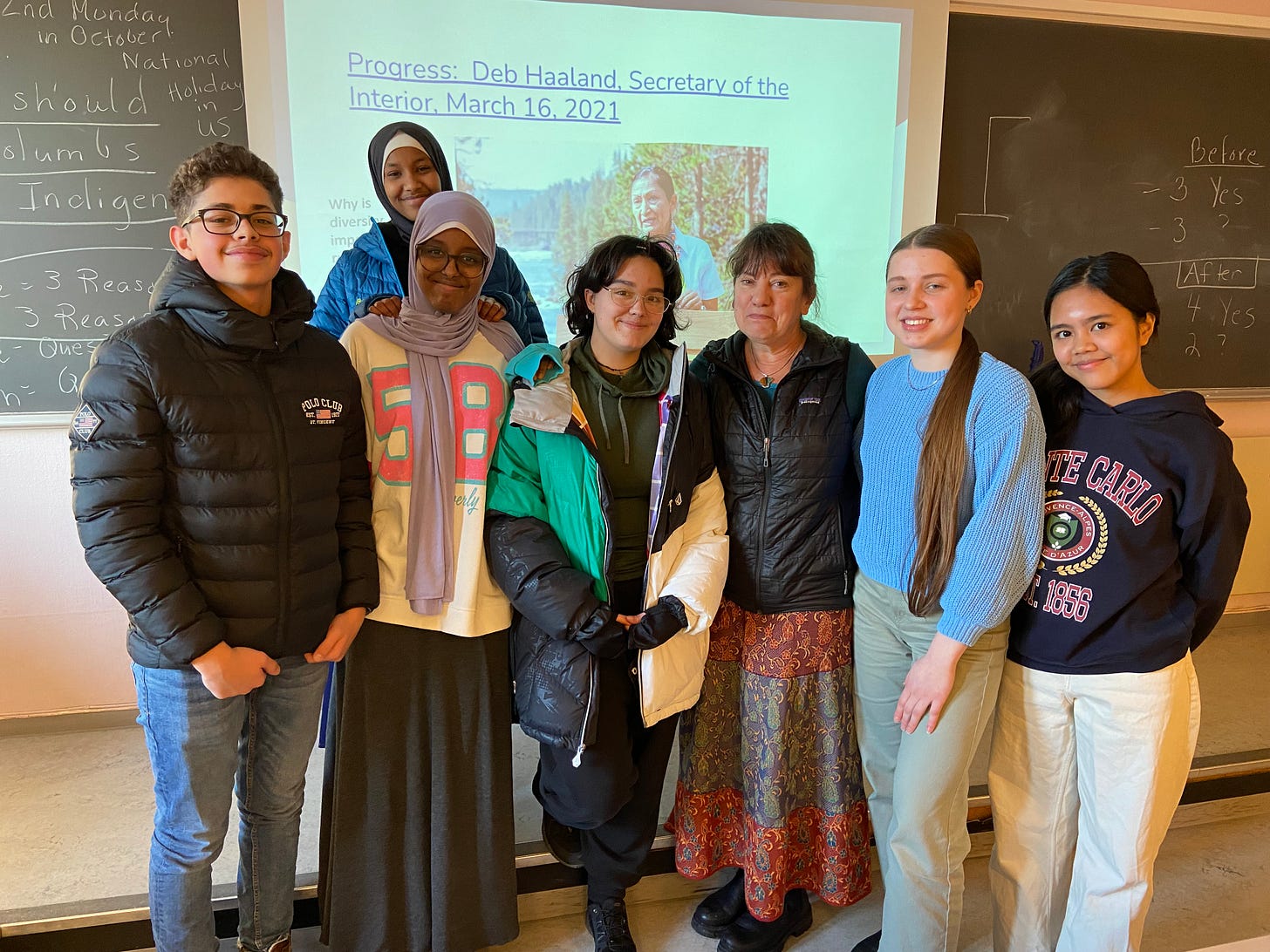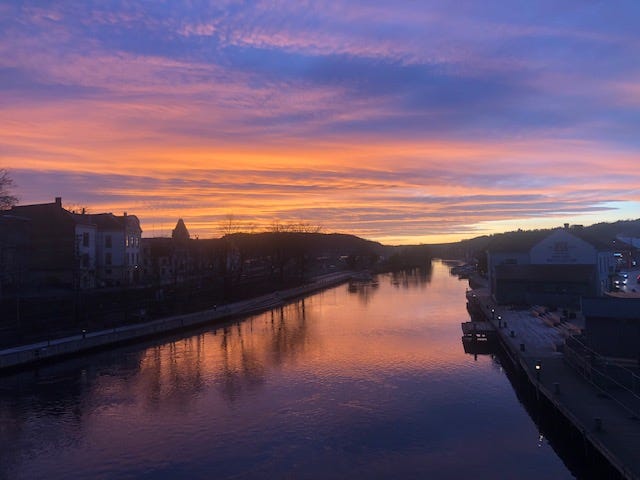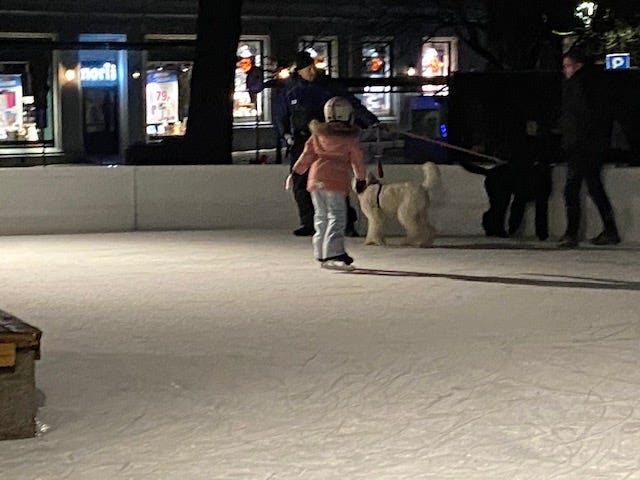Thoughts on Diversity
Betsy:
My favorite student workshop to teach in Norway is entitled “Where I am From,” and is inspired by the poem from Kentucky writer and teacher George Ella Lyon and from her “I am From Project” (2018) she developed with Julie Landsman in response “to the rising rhetoric of xenophobia and isolationism they saw developing in the United States.
In my workshop, I introduce the students to the Appalachian culture, trying to dispel the typical stereotypes that can unfairly represent my home. (When I teach this workshop, I also think of one of my favorite colleagues at Brevard College, Tina Holland, and her classes in Appalachia Studies at Brevard College and Blue Ridge Community College.) I share poems from Appalachian teenagers and then ask the Norwegian students to write their own “Where I’m From” poem to share with my American students when I return. The poems from the Norwegian students represent a country rich with a growing diversity of nationalities and traditions and defies the stereotype of Norway as a small homogeneous country of blond haired blue-eyed people. Although Norway is a small country, it is a country rich in immigrants. In one of the English classes I taught, out of 17 students, seven countries were represented: Somalia, Spain, Philippines, Jordan, Ukraine, Lithuania, and Syria, all young people immigrating to Norway in search of a better life with their families.
Below is a collective poem I created from a compilation of lines taken from original student poems written in the “Where I am From” workshop. (Students gave me permission to share.) The growing diversity I see in Appalachia, in Norway, and in the world at large, is a strength that may be what ultimately saves us and our collective future. Read their lines and enjoy the diversity of culture and places and the many different voices.
Where I am From (A compilation of lines taken from original poems from students in Norwegian classes this semester)
I am from the smallest Balkan nation, Kosovo, and from Halden, a small town in Norway.
I am from arguing with love and talking for hours, from “patience is a virtue” to “walk with good posture.”
I am from the sound of my dad’s guitar, from wet boat ropes and crab fishing on the port.
I am from the place where the goat climbs up on the trees.
I am from the father that had to share his shoes with his own brother because his family could only afford one pair.
I’m from eid and Mama and Baba saying insallah when I ask for something.
I’m from the northern lights of Tromsø and the gray rainclouds of Bergen, to the sidewalks and streets of Oslo and Moss.
I am from a non-Christian household with images of Jesus on the walls.
I am from farmers and animal caretakers, from forests with birds singing and saddles smelling like leather.
I am from Grandpa who smuggled a radio onto the Ferry during WW II.
I am from Somalia, the horn of Africa.
I am from a strict mother and a “can’t say no father.”
I am from my grandma’s mushroom statue. (I love that statue, It’s like a mushroom house and there are small people living in it.)
I am from “Do you wanna workout with me” to “let’s knit together.”
I am from a cup of qahwa, from al durra and attar.
I am from darkness at four in the afternoon, and sitting by the fire, reading Harry Potter.
I am from wood anemones, small, white stars in the forest.
I’m from long cooked lamb, halibut, sodd, and kleppsuppe.
I am from the Albanian culture, people who are known to be strong and beatific, but aggressive and protective.
I am from Casablanca…….and Tromsø.
I am from computers, from video games and virtual reality.
I am from the accordion that my grandfather played in a band when he met my grandmother, and the cane my great-grandfather walked with.
I am from the place with more pyramids than Egypt, where the people are poor but always happy, Sudan.
I am from seagulls and the old fishing boat on a dirty river.
I am from the papers my grandfather wrote in a dark cellar.
I’m from “Satan will pee in your mouth if you yawn without covering your mouth.”
I’m from Buddha statues, Christian crosses, and never going to Church.
I’m from Halden and Finland, sushi and taco Friday.
I am from Norway, my home.
I am, despite the cold, warm.
Mark:
Since our last post, we traveled back to the States to spend time with my family over the holidays. Although we made flight reservations back in October, neither of us were certain if we could easily return to Norway without having a temporary residence card or permit (something that is needed when your stay exceeds 90 days in Norway or other Schengen countries). Betsy’s card arrived two weeks prior to our leaving while I only received an email stating that I was granted a temporary permit two days before our trip home. With that we decided to travel. The return trip was uneventful and we had no problems when returning to Oslo.
The total time to obtain a residency card was well over seven months, involved a trip from Brevard to Houston, Texas, and multiple calls and emails to the Norwegian immigration office and Norwegian Consult Office in New York City to check on the status of our permits. Each time, we were told that we were in the “que” but had to wait our turn – just like all other applicants. The reality is that our wait time was relatively short. We are fortunate because we are Americans, Betsy is a Fulbright Scholar, we have a permanent address in Halden, and, importantly, we have our own funds. The real challenge is for those trying to move to Norway on a permanent basis because of economic hardship or war.
I think about the number of Ukrainians torn from their country by Putin’s and the Kremlin’s immoral war and the thousands of others from places suffering from ongoing drought, regional conflict, and economic hardship – all made worse by climate change. It takes a tremendous amount of courage, determination, and hope to successfully move yourself and your family to a new country and essentially reinvent who you are. And while I don’t want to get into the politics of our own immigration issues in the United States, it does seem that our country is woefully indifferent or even negligent in how we address immigration issues. Certainly a 1,954-mile wall is not a reasonable solution, nor is using temporary restrictions based on a response to COVID, as the Supreme Court just ruled. Ultimately, it will take Congress passing new comprehensive legislation that addresses those already in the country and those seeking asylum. In the meantime, the reality is that the United States (like most European countries – including Norway) needs immigrants willing to pursue the same dream for themselves and their families as did most, if not all, of our ancestors did when they chose to leave their country and voyage to the United States (or what would become the United States).
Will our country change with the addition of new citizens? Yes. Just as much as it did with successive waves of immigrants from England, Ireland, Africa (most not of their own volition), Norway, France, Germany, China, Italy, and many other parts of the world since the initial settlement of the colonies. The genius of our country is that the core to our values is not skin color or ethnic or social background, but a desire to bind past, present, and future generations on a belief that all men are created equal in their desire to, among other things, pursue happiness.
Sure, there may be some immigrants that seek to “use” our system, but I’m more concerned about the individuals and corporations (remember Citizens United) who seek extra ordinary ways to preserve their wealth while exploiting a system that helped provide them with the means to have a successful business. One of my biggest challenges when I was responsible for Transylvania County’s economic development was working with current or perspective business owners who frequently shared that theirs was a “self-made” business. I have no doubt that many of these individuals were smart (some I questioned) and ambitious – and many had good motives. What almost all forgot was that their business or manufacturing company benefited from successful public schools, well maintained public roads and the exchange of goods through interstate commerce, sufficient public water and sewer, and often financial incentives from the city, county or even the state.
Back here in Halden, Betsy and I continue to be amazed by the diversity of people and their “heartiness”. Betsy sees this in the schools she visits and at the local college that she teaches. It’s also evident as you walk through town. Snow will be several inches deep and you see young parents pushing baby strollers with infants well bundled and senior trudging along with their four-wheeled walkers through the snow. With grit and determination, they just keep moving forward.
Tomorrow, I will go to the “Halden Frivillig Sentral” or the Halden Volunteer Center and tutor individuals like Sowa, from Somalia, on how to speak English – having already learned her native language, Norwegian and most likely a third language. In return, Sowa and others assist me with my Norwegian. Have I mentioned how difficult the language is? My guess is that there are some in Brevard that might roll their eyes askance and suggest that it’s more likely me - the person trying to learn.
Finally, today we had 7:43 hours of daylight (plus approximately 50 minutes of both first and last light). By March 21st, we’ll be at 12:00 hours of daylight. The pendulum keeps moving.
Thinking of home, Betsy and Mark





